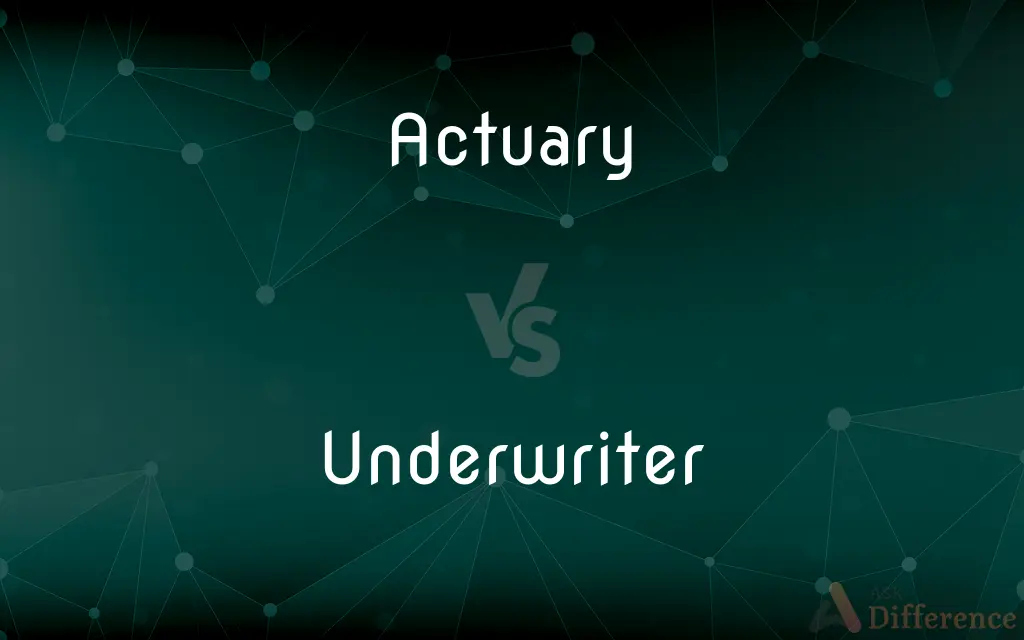Actuary vs. Underwriter — What's the Difference?
By Tayyaba Rehman & Urooj Arif — Updated on May 17, 2024
An actuary uses mathematics and statistics to assess financial risks, while an underwriter evaluates and decides on the acceptance of risks for insurance policies.

Difference Between Actuary and Underwriter
Table of Contents
ADVERTISEMENT
Key Differences
An actuary is a professional who uses mathematical, statistical, and financial theories to assess and manage financial risks. Actuaries primarily work in the insurance industry, pensions, and investment sectors, where they develop models to predict future events and their financial impact. An underwriter, on the other hand, is responsible for evaluating the risks associated with insuring individuals or entities and deciding on the terms and pricing of insurance policies. Underwriters review applications, assess risk factors, and determine whether to provide coverage and at what cost.
Actuaries create the frameworks and models that underwriters use to make their decisions. While actuaries focus on the long-term financial implications and the development of risk assessment tools, underwriters apply these tools in their day-to-day operations to evaluate individual cases and make practical decisions.
In terms of qualifications, actuaries typically require extensive training in mathematics, statistics, and actuarial science, often undergoing rigorous certification processes. Underwriters usually have backgrounds in finance, business, or insurance, and their training focuses more on the practical aspects of risk assessment and policy management.
Comparison Chart
Primary Role
Assess and manage financial risks
Evaluate and decide on insurance risks
Key Skills
Mathematics, statistics, financial theory
Risk assessment, decision-making
ADVERTISEMENT
Industry Focus
Insurance, pensions, investments
Insurance
Tools Used
Probability tables, financial models
Risk assessment tools, applications
Qualifications
Extensive training, certifications
Background in finance, business, insurance
Compare with Definitions
Actuary
Develops models to predict the likelihood of events and their financial impact.
The actuary created a model to estimate the cost of natural disasters for the insurance company.
Underwriter
Determines the terms and pricing of insurance policies.
The underwriter set the premium based on the applicant's health history.
Actuary
A professional who assesses financial risks using mathematical and statistical methods.
The actuary analyzed the data to forecast future pension fund liabilities.
Underwriter
Works primarily in the insurance industry.
As an underwriter, she specializes in automobile insurance.
Actuary
Works in insurance, pensions, and investments to ensure financial stability.
As an actuary, she helps design life insurance policies that are financially sound.
Underwriter
Utilizes risk assessment tools and guidelines to make decisions.
The underwriter used a risk assessment tool to evaluate the life insurance application.
Actuary
An actuary is a business professional who deals with the measurement and management of risk and uncertainty. The name of the corresponding field is actuarial science.
Underwriter
A professional who evaluates risks and decides on the acceptance of insurance policies.
The underwriter reviewed the application and decided to approve the coverage.
Actuary
A statistician who computes insurance risks and premiums.
Underwriter
Assesses individual applications to balance risk and profitability.
The underwriter carefully assessed the property to determine its insurability.
Actuary
(dated) Registrar, clerk. 16th-19th c.
Underwriter
A person or firm engaged in the insurance business.
Actuary
A professional who calculates financial values associated with uncertain events subject to risk, such as insurance premiums or pension contributions.
Underwriter
An insurance agent who assesses the risk of enrolling an applicant for coverage or a policy.
Actuary
A registrar or clerk; - used originally in courts of civil law jurisdiction, but in Europe used for a clerk or registrar generally.
Underwriter
One that guarantees the purchase of a full issue of stocks or bonds.
Actuary
The computing official of an insurance company; one whose profession it is to calculate for insurance companies the risks and premiums for life, fire, and other insurances.
Underwriter
A sponsor, as of a television show.
Actuary
Someone versed in the collection and interpretation of numerical data (especially someone who uses statistics to calculate insurance premiums)
Underwriter
An entity assuming a financial risk.
Actuary
Uses probability tables and statistical analysis.
The actuary used probability tables to determine the premium rates for health insurance.
Underwriter
(insurance) A person working for an insurance company who arranges and authorizes an insurance policy with a broker or insured.
Actuary
Requires rigorous certification and training.
He became a certified actuary after passing several challenging exams.
Underwriter
(finance) An entity undertaking to market newly issued securities.
They were the underwriters of the company's shares, but only on a "best efforts" basis.
Underwriter
One who underwrites his name to the conditions of an insurance policy, especially of a marine policy; an insurer.
Underwriter
A banker who deals chiefly in underwriting new securities
Underwriter
An agent who sells insurance
Underwriter
A financial institution that sells insurance
Common Curiosities
What does an actuary do?
An actuary assesses and manages financial risks using mathematical and statistical methods.
What is the primary role of an underwriter?
An underwriter evaluates risks and decides on the acceptance and terms of insurance policies.
Which industries do actuaries work in?
Actuaries work in insurance, pensions, investments, and related financial sectors.
Do underwriters need certification?
Underwriters typically do not require the rigorous certification that actuaries do, but they often have relevant training in finance or insurance.
What skills are essential for an actuary?
Key skills for an actuary include mathematics, statistics, and financial theory.
Do underwriters set insurance premiums?
Yes, underwriters determine the pricing and terms of insurance policies based on their risk evaluation.
How do actuaries impact insurance companies?
Actuaries develop models and frameworks that help insurance companies plan for long-term financial stability.
What tools do underwriters use?
Underwriters use risk assessment tools, applications, and company guidelines to make decisions.
What is the main difference between an actuary and an underwriter?
The main difference is that actuaries create risk assessment models, while underwriters apply these models to evaluate individual cases.
Is actuarial work more theoretical than underwriting?
Yes, actuarial work involves more theoretical and statistical analysis, while underwriting is more practical and application-based.
Can actuaries work outside of insurance?
Yes, actuaries can also work in pensions, healthcare, investments, and any field that requires risk assessment.
Do underwriters need to understand financial models?
Yes, underwriters use financial models and risk assessment tools developed by actuaries.
What educational background is common for underwriters?
Underwriters typically have backgrounds in finance, business, or insurance.
Can an underwriter become an actuary?
With additional education and certification, an underwriter can transition to becoming an actuary.
Are actuaries involved in direct customer interactions?
Actuaries usually work behind the scenes and are not involved in direct customer interactions.
Share Your Discovery

Previous Comparison
Program vs. Agenda
Next Comparison
Hydronium vs. HydroxideAuthor Spotlight
Written by
Tayyaba RehmanTayyaba Rehman is a distinguished writer, currently serving as a primary contributor to askdifference.com. As a researcher in semantics and etymology, Tayyaba's passion for the complexity of languages and their distinctions has found a perfect home on the platform. Tayyaba delves into the intricacies of language, distinguishing between commonly confused words and phrases, thereby providing clarity for readers worldwide.
Co-written by
Urooj ArifUrooj is a skilled content writer at Ask Difference, known for her exceptional ability to simplify complex topics into engaging and informative content. With a passion for research and a flair for clear, concise writing, she consistently delivers articles that resonate with our diverse audience.
















































